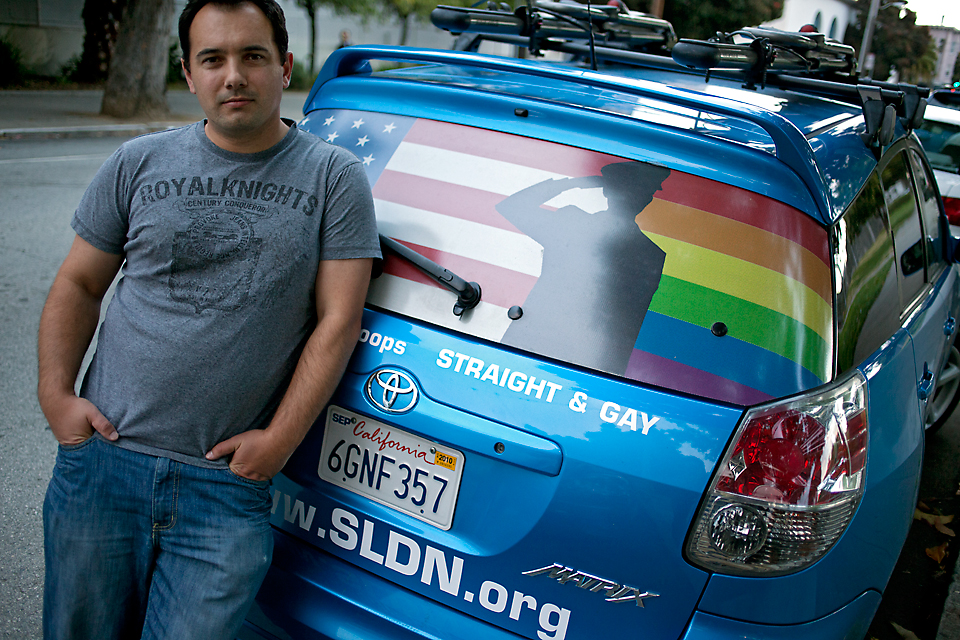Anthony Loverde, an Iraq war veteran who was discharged from the military for being gay, testified last month in a federal court case in Riverside that declared “don’t ask, don’t tell” unconstitutional — a decision that could pave the way to lifting the ban entirely.
Loverde, 31, was serving aboard a C-130 cargo jet on a mission in Iraq when he realized he could no longer live under the Clinton-era ban, which mandates the discharge of openly gay, lesbian or bisexual soldiers.
“I fell in love with the Air Force,” Loverde said. “But I was leading a double life and I couldn’t take it anymore.”
So, he decided to try to change the law instead of living under it.
Loverde, one of 12 expert witnesses or former service members to testify about the difficulty of living under “don’t ask, don’t tell,” has been working closely with military and gay rights groups to pressure Congress to lift the ban.
The Log Cabin Republicans, a gay-rights group, won the case against the government on Sept. 9, when Judge Virginia Phillips agreed that the ban against gays serving openly in the military violates their First and Fifth Amendment rights to free speech and due process.
The ban has a “direct and deleterious effect” on the military, Phillips said in her ruling. She issued an injunction and is expected to rule on the issue next week.
Backers of lifting the ban say momentum is building for a final vote in the Senate. Nearly five months ago the House of Representatives and the Senate Armed Services Committee voted in favor of repealing the ban 234-194 and 16-12, respectively.
“We’re expecting a decision on Sept. 20,” said Trevor Thomas, a spokesman for the Servicemembers Legal Defense Network, a nonprofit group that formed in 1993, the same year “don’t ask, don’t tell” was passed.
The central mission for the Washington, D.C.-based group of lawyers and political advisers is to repeal the law and offer legal support to soldiers affected by the ban.
“All hands are on deck to make sure we have the 60 filibuster-proof votes when we move to the Senate floor,” Thomas said.
But Sen. John McCain, R-Ariz., has been very public about his intention to filibuster, Thomas said.
“We’re closely watching Senator McCain,” Thomas said. “He is one of our strongest opponents, and he’s in full force.”
McCain told the Senate Armed Services Committee in May that “we should not be seeking to overturn the ‘don’t ask, don’t tell’ policy.”
Despite the ruling that the policy is unconstitutional, implementation of its reversal is on hold until the government decides whether to appeal the decision.
And the law can’t be overhauled until the Department of Defense completes a comprehensive review of the possible effects on unit morale, cohesion and readiness, the three foremost reasons opponents of changing the policy cite.
Opponents of the ban say it needs to be repealed because critical skills, military readiness and retention suffer under it.
“As far as the ruling is concerned, I do agree it’ll increase the pressure on Congress to repeal this law,” Loverde said.
The Department of Defense sent out 400,000 surveys to military personnel that were due Aug. 15. The surveys asked how soldiers felt about lifting the ban. The results will be added to the report, due Dec. 1, and used to inform the president on the implications of lifting the ban, one of his campaign pledges.
“This year, I will work with Congress and our military to finally repeal the law that denies gay Americans the right to serve the country they love because of who they are,” Obama said in his State of the Union speech in January. “It’s the right thing to do.”
Two responses to the survey were posted to the Department of Defense website.
Gary Reno, from Kearny, Mo., wrote: “I served 24 years in the U.S. Army. During that time I had the occasion to have run across several gays, both male and female, one of which was even my battalion commander. Although they kept a low profile once their sexual preference became known they were treated like lepers. Not to mention being the blunt of jokes and pranks. As platoon sergeant I was required to intervene when this happened, especially when threats occurred. No one wanted to work beside them or associate themselves with them, not just because they disliked them but also because they didn’t want to be labeled themselves. From those experiences I know that there is no place in the military for gays and lesbians. Absolutely no good can come of repealing the ‘don’t ask, don’t tell’ law.”
Retired Staff Sgt. Richard Baker, from Norwalk, Conn., wrote: “Are there really any members of the military who think that there are no gays in the military? It is time to move forward. This is an all-volunteer military and we are turning a lot of people away who are willing to serve.”
About 13,500 people have been discharged under the “don’t ask, don’t tell” policy since 1993, according to the Servicemembers Legal Defense Network.









